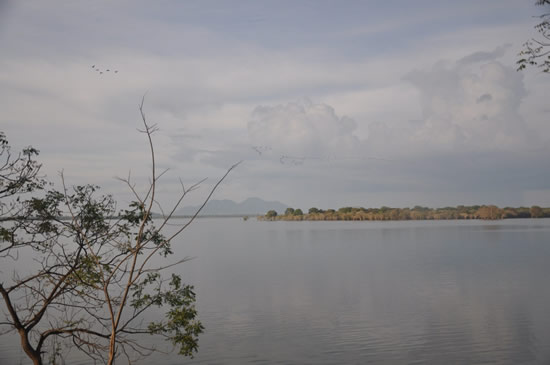Farmers protest illegal excavations at the Kala Wewa Reservoir
The artificial lake with two reservoirs in the North-Central Province was damaged. The original irrigation system, which dates to the 5th century, is crucial for thousands of people who still depend on it today. Multiple investigations have been launched, but residents fear local authorities are involved.
Colombo (AsiaNews) – A group of farmers has launched protest action against illegal excavations that have damaged the Kala Wewa reservoir complex, which includes two reservoirs, Kala Wewa and Balalu Wewa.
Located in Anuradhapura district, in Sri Lanka’s North-Central Province, its irrigation system goes back to the 5th century AD.
According to residents, heavy machinery damaged the rock surface, putting the reservoir at risk. The latter has a capacity of 123 million cubic metres and is equipped with a stone spillway and three main sluices.
Water from the central sluice flows through a canal about 12 metres wide for about 86 kilometres and supplies water to Nuwara Wewa in Anuradhapura, as well as irrigating thousands of hectares of rice paddies.
But excavations have damaged the Bisō-koṭuwa, the equivalent of a modern valve-pit that regulates the outflow of water, built on the surface of the rock near the ancient exit base of the Kala Wewa reservoir.
Farmers suspect that this operation took place with the complicity of officials from the Mahaweli Authority, the state-owned agency that oversees 10 large dams in Sri Lanka and which took over the site some 56 years ago. The excavation site is in fact located near an area that belongs to the Mahaweli Authority.
The farmers held a religious ceremony to demand punishment for those who excavated the site.
“For generations, our families have lived in this area as farmers, and about 2,500 farmers depend on this project,” said Punchibanda Wijepala, 63, Gunapala Samaratunga, 58, and Priyantha Sumanasiri, 55, speaking to AsiaNews.
“They have damaged the Bisō-koṭuwa, which is the heart of the project. These historical places need protection.”
What is more, “They have also commenced a boat service here and the political authority in the area is also connected to this plot. Hence, they are silent. But we cannot be silent as we are living here. We will not allow these robbers to exploit this valuable resource. We request the authorities to arrest the culprits.”
According to Prof Thushitha Mendis, director general of archaeology, a report would be handed over to the police today following an investigation into the recent unauthorised excavations.
The Ipalogama Police Station launched its own investigation into the incident and tomorrow will report the matter to the court in Kekirawa.
“A special committee has been appointed on the advice of Irrigation, Wildlife and Forest Conservation Minister Pavithra Wanniarachchi to initiate a preliminary investigation into the illegal excavations that have been carried out at the location,” said Mahendra Abeywardena, director general of the Sri Lanka Mahaweli Development Authority.
Other officials from the archaeology department explained that “in 2019, the Cabinet of Ministers approved the enactment of fresh legislation to increase fines and jail terms for those convicted of vandalising archaeological sites and artefacts.”
The extant legislation was introduced in the 1940s when the country was still under British rule.
16/11/2019 09:00
08/08/2023 16:09
08/05/2020 13:19
12/02/2024 13:34
19/07/2005







.png)










